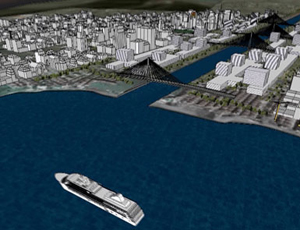One month after announcing ambitious plans to dig a 50-km-long shipping canal 100 km west of the Bosphorus Strait, Prime Minister Tayyip Erdogan’s scheme is being dismissed by some as election grandstanding designed to gain leverage for Turkey in talks with Russia to secure commitments of crude for the languishing Samsun-Ceyhan oil pipeline project.


The grand canal scheme, which was announced with fanfare on April 27, in advance of Turkey’s general election on June 12, calls for construction of the 120-meter-wide, 25-meter-deep commercial shipping channel -- large enough accommodate supertankers of up to 300,000 dwt – at a cost estimated between $10 - $40 billion. The canal would divert traffic from the Bosphorus Straits, the sole maritime link between the Black Sea and the Mediterranean.
Commentators say Mr. Erdogan’s political party is “fronting its campaign on massive infrastructure projects, especially for İstanbul and Ankara” while The Wall Street Journal commented on the “big element of electioneering” in the Prime Minister’s plans for the canal and construction of two new earthquake resistant urban centers on the outskirts of Istanbul, one on the European side and one on the Asian side of the city.
At the heart of the problem is the fact that free passage of merchant shipping through the Bosphorus is guaranteed by the 1936 Montreaux Convention, which ended centuries of conflict between Russia and Turkey.
“If passage is free through the Bosphorus, then why would anyone use this canal?” Russian Ambassador to Turkey Vladimir Ivanovsky asked, highlighting not only the international legal aspects of the project, but also the economic impact.
In contrast to the dangerously winding and overcrowded Bosphorus strait, which must be closed in both directions to allow the largest tankers through, the canal would accommodate two-way traffic, thus offering tankers a safer and quicker route. Increasing oil production in the Caspian region is expected to double the number of tankers using the Bosphorus from a current average of 27 a day to more than 50, which would further congest the strait and put Istanbul’s 11 million inhabitants at higher risk for potential environmental disaster. The U.S. Energy Information Administration calls the strait “one of the world’s busiest chokepoints” and “most difficult waterways to navigate.”
For years Turkey has been searching for ways to bypass the Bosphorus. One of these is the proposed Samsun Ceyhan pipeline, sponsored by Turkey’s Calik Energy and Eni of Italy. The crude oil pipeline would carry 60-70 million tons of oil per year from the Turkish Black Sea port of Samsun to Ceyhan terminal on the Mediterranean. But Russian pipeline monopoly Transneft pulled out of negotiations with the Turkish side in September, arguing that the cost of transporting oil over the straits in tankers is lower compared to transit through the Samsun-Ceyhan Pipeline. According to the Financial Times “many are viewing the canal as a bargaining ploy to pressure Moscow to moderate its demands for a majority stake in the Samsun-Ceylan pipeline – albeit one that doubles as a handy pre-election stunt.”
The Istanbul canal could potentially undermine the viability of the 3,900-km-long Nabucco gas pipeline. Emre Iseri, Associate Professor of International Relations and energy policy expert at Kadir Has University in Istanbul says "Turkey always argues that pipelines like Nabucco are to relieve pressure on the Bosphorus. With the canal, that argument could become redundant. Improving and cheaper Liquefied Natural Gas technology is making transportation by tanker increasingly more competitive than pipelines.” So far, neither Azerbaijan nor Turkmenistan has made a commitment to supply gas to the Nabucco pipeline.
Environmentalists are also dubious over the canal scheme, since an independent environmental impact study for the proposed canal has not yet been done. Critics point out that two seas that the canal would connect have different salt levels and altering the salinity of the Black Sea could potentially threaten some of Europe's most important rivers, such as the Danube and Volga. Professor Cemal Saydam of Hacettepe University’s Environment Engineering Department said that the canal could drain the Black Sea into the Marmara Sea. “If the present height difference between the Black Sea and Marmara Sea, currently 30 cm, decreases to 28 cm, a catastrophe could happen, disrupting ecological balances that have been formed over 3,500 years.” Cengiz Aktar, a professor of international relations at Bahcesehir University, argued that all Black Sea countries would have to be consulted, asserting that "the environmental impact could be so huge that the project won’t be feasible.”



Post a comment to this article
Report Abusive Comment